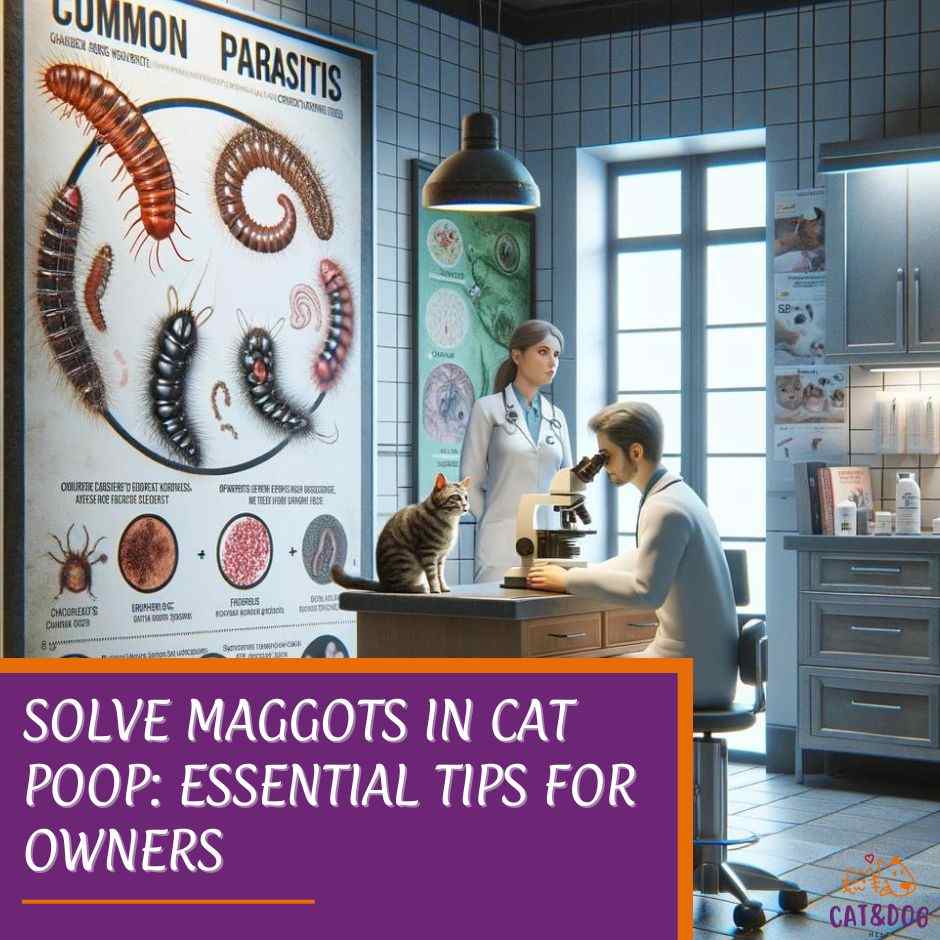Oh, the surprises our feline friends can leave for us! Finding maggots in your cat’s poop can be quite the shock and understandably a cause for concern.
If these wriggly, unwanted guests have made an appearance, you’re probably wondering what to do next. While it may be a little gross, it’s important to stay calm and informed.
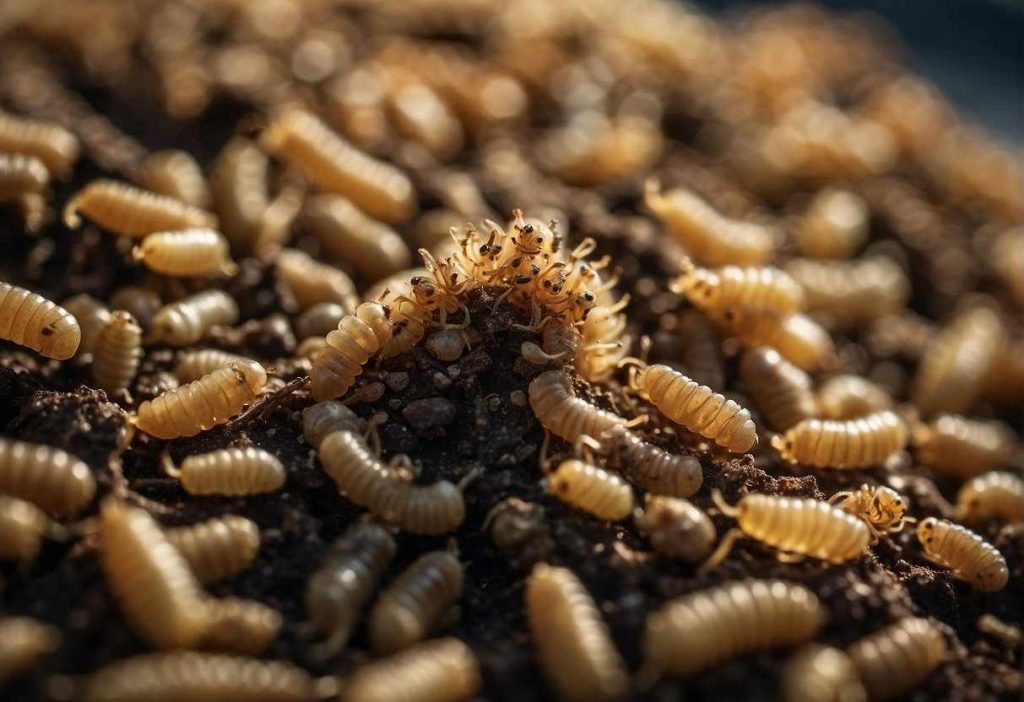
These little larvae can point to several health issues, some of them serious, or environmental problems that need to be addressed promptly. (1)
Quick action can prevent further health complications for your cat and ensure these intruders don’t make a return visit.
Plus, understanding the causes can lead to effective prevention, setting you on a path to avoiding future occurrences.
Key Takeaways
- Discovering maggots in cat poop suggests potential health or environmental issues.
- Prompt identification and treatment are crucial to prevent further complications.
- Prevention and awareness are key to ensuring your cat’s continued health.
Recognizing Maggots in Cat Poop
Maggots, the larvae of flies, are typically small, white, and tubular. They range in size but can grow up to a half-inch in length. (2)
What’s distinctive about them is their movement; you’ll see them squirming if they’re present in your cat’s poop.
Did you know that early detection can be a game-changer? It’s true!
Regularly checking your cat’s litter is crucial. So next time, take that extra moment to observe – it’s all about keeping your feline friend healthy and happy. (3)
Here’s a quick rundown to make identification easier:
- Size: Often around a quarter to a half-inch long
- Color: Pale or creamy white
- Movement: Look for a distinctive squirm or wriggle
Don’t be shy about peeking into the litter box. Think of it as a detective mission – you’re on the lookout for clues that ensure your pet’s well-being.
Spotting these little critters early can save you and your kitty a heap of trouble, so keep those eyes peeled!
Immediate Actions and Treatment

First Response to Maggots in Cat Poop
Got your gloves on? Great, because maintaining hygiene is key. Here’s what to do:
- Isolate the Area: Keep your cat away from the messy site to prevent reinfestation or spreading.
- Removal:
- Gently scoop the affected feces into a sealed bag.
- If you spot maggots around, a damp paper towel will do the trick.
- Disinfect:
- Use a pet-safe disinfectant to clean the area thoroughly.
- Make sure all traces of feces and maggots are gone.
Professional Treatment Options
Now, for a less squirmish and more thorough approach, you might want to chat with your vet—here’s why:
- Manual Removal: Sure, you’ve removed what you saw, but a vet can check for any that might have been missed.
- Medication: Sometimes, an antiparasitic medication is necessary to combat any lingering larvae.
- Potential Surgeries: In severe cases, surgery might be on the cards to ensure all maggots are removed.
Remember, maggots can indicate a bigger issue, so a vet visit isn’t just a good idea; it’s a must!
Don’t panic, act promptly, and keep your cool.
You’ve got your quick guide to initial maggot management and the importance of professional follow-up. Your kitty will be back on track in no time!
Causes and Risks
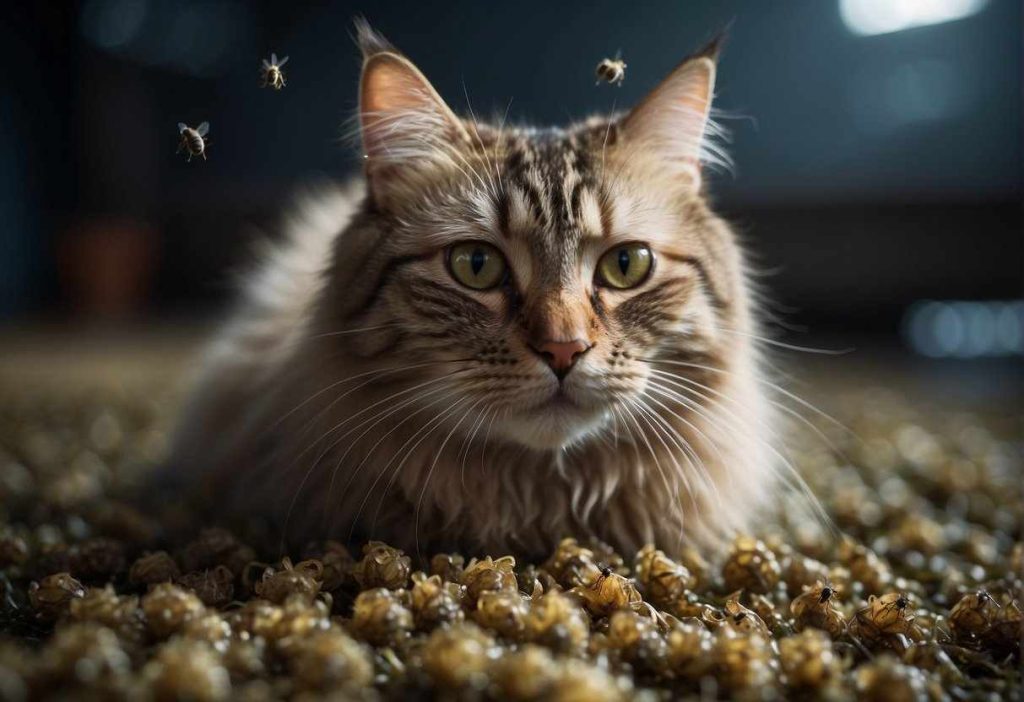
Flies, the not-so-welcome aerial visitors in our homes, are often drawn to your cat’s litter box.
They have a rather gruesome hobby: laying eggs in fecal matter or any open wounds, which inevitably become squirming maggots. Yuck!
These wriggly larvae love to feast on organic material, including… well, you know.
Now, what’s at stake health-wise? Both for your feline friend and for you:
- For Cats: Maggots can cause a condition in cats known as myiasis, where the larvae infest wounds or even live tissue. It’s uncomfortable and downright dangerous for kitty’s health. (4)
- For Humans: You’re not off the hook, either. These maggots and their fly parents can spread diseases, and some can, unfortunately, jump between species—a risk we call “zoonotic.” (5)
Here’s a quick rundown of the risks:
| Risks to Cats | Risks to Humans |
|---|---|
| Myiasis infection | Zoonotic diseases |
| Wound complications | Hygienic concerns |
| Secondary infections |
Remember: Keep an eye on your cat’s litter and ensure wounds are treated quickly to avoid these uninvited guests!
Regular cleaning can keep flies away, and preclude the maggot party nobody wants to host. Let’s keep those tails wagging and homes fly-free!
Preventive Measures
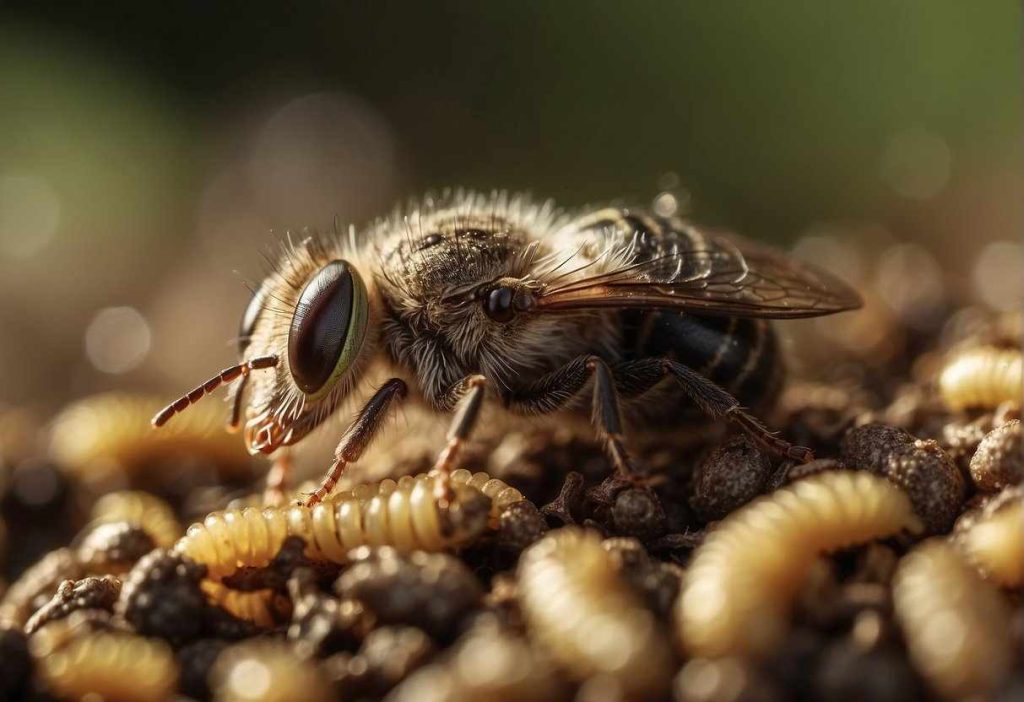
Keeping Your Environment Clean
Ever wonder why you’re seeing maggots in your cat’s poop? It could be due to flies finding a cozy nesting place. What can you do? Start with the basics:
- Secure the Trash: Flies adore garbage. Make sure trash cans have tight-fitting lids and empty them regularly. (6)
- Litter Box Maintenance: The litter box is a fly magnet. Scoop daily and deep-clean weekly. Consider covered litter boxes to keep the pests out.
Supporting Your Cat’s Health
You love your furry friend, right? Let’s keep them healthy and fly-free!
- Regular Grooming: Brush your cat often. It helps to spot any wounds that could attract flies—and just makes your cat feel pampered.
- Health Check-ups: Like you, your cat needs regular check-ups. Catching health issues early can prevent problems that flies might find appealing. (7)
- Diet Matters: Feed your cat high-quality food. A good diet strengthens the immune system, making your cat less susceptible to infections.
By keeping things clean and focusing on your cat’s health, you’re slamming the door in flies’ faces, ensuring those wriggly maggots stay a story rather than reality.
Remember, a little effort goes a long way to keeping your buddy safe and your home maggot-free!
Recovery and Long-Term Management
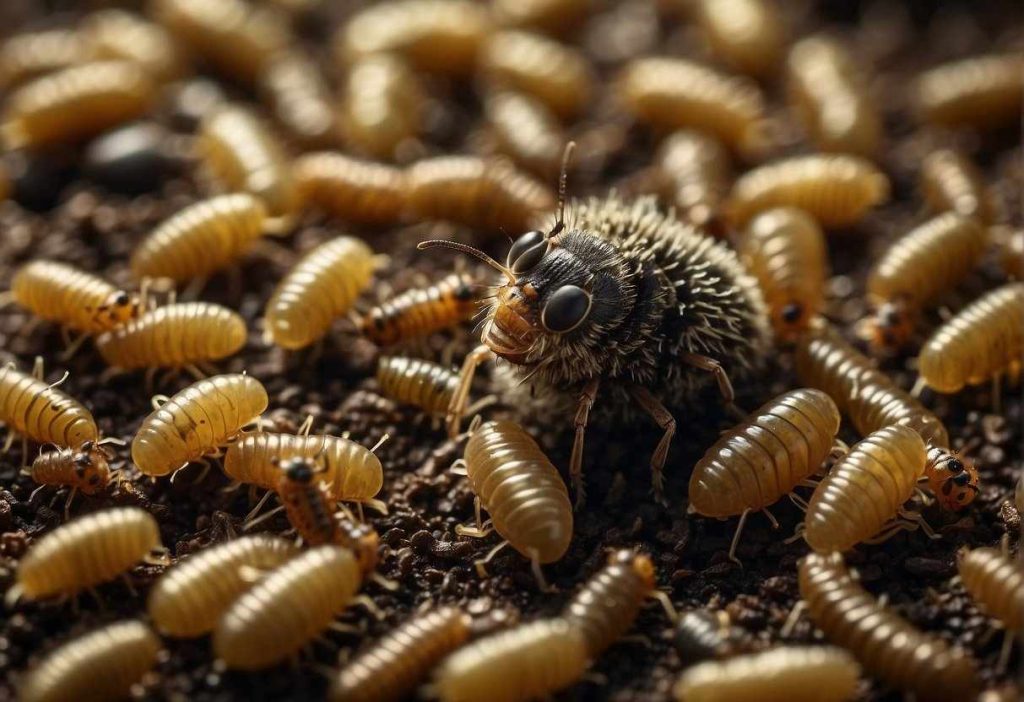
Aftercare Following Treatment
After your cat has been treated for maggots, here’s what you should keep an eye on:
- Wound Care: Gently clean the affected area with prescribed antiseptic solutions.
- Monitoring: Watch for redness, swelling, or discharge which could signal an infection.
- Reinfestation Prevention: Inspect your cat’s poop daily for a while — no surprise visitors allowed!
Ongoing Health Management
Maintaining your furry friend’s health involves a couple of key habits:
- Veterinary Visits: Schedule regular check-ups. Cats are secretive about how they feel!
- Clean Environment: Keep litter boxes immaculate and your home free of decomposing organic matter.
Remember, it’s not just about healing, but also about giving those pesky maggots zero chances of making a comeback!
Additional Considerations
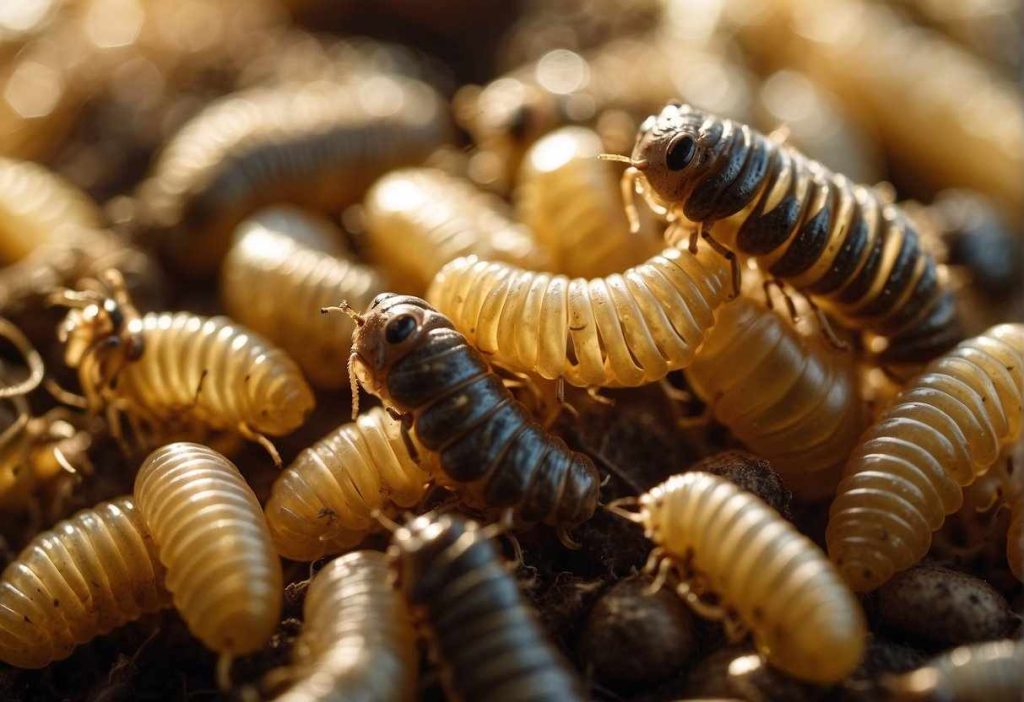
Debunking Common Myths
Have you ever heard someone say that only outdoor cats get maggots in their poop? Let’s clear that up right now: indoor cats are also at risk.
Maggots, also known as fly larvae, don’t discriminate based on your cat’s lifestyle!
Nutritional Support for Immune Health
Did you know that a proper diet does more than just keep your cat’s fur shiny? It strengthens their immune system, which can repel not just sickness but also those pesky maggots.
Feed your fluffball quality food and watch them thrive—maggot-free!
Myths vs. Facts
| Myth | Fact |
|---|---|
| “Maggots only affect outdoor cats.” | Wrong. Indoor cats can get them, too. |
| “Maggots in cat poop is a minor issue.” | Nope. It can indicate a health risk for your cat. |
Optimizing Your Cat’s Diet
- Protein: Essential for immune health—keep it high quality!
- Vitamins: A, B, C, and E are immunity superstars.
- Fibre: For digestive health—helps keep those maggots at bay.
Remember, a cat in good health is your best defense against unwelcome invaders.
Keep your cat’s litter box clean, their environment stress-free, and their tummy full of nutritious noms. It’s the little things that make a big difference—your kitty will thank you!
Quick Recap
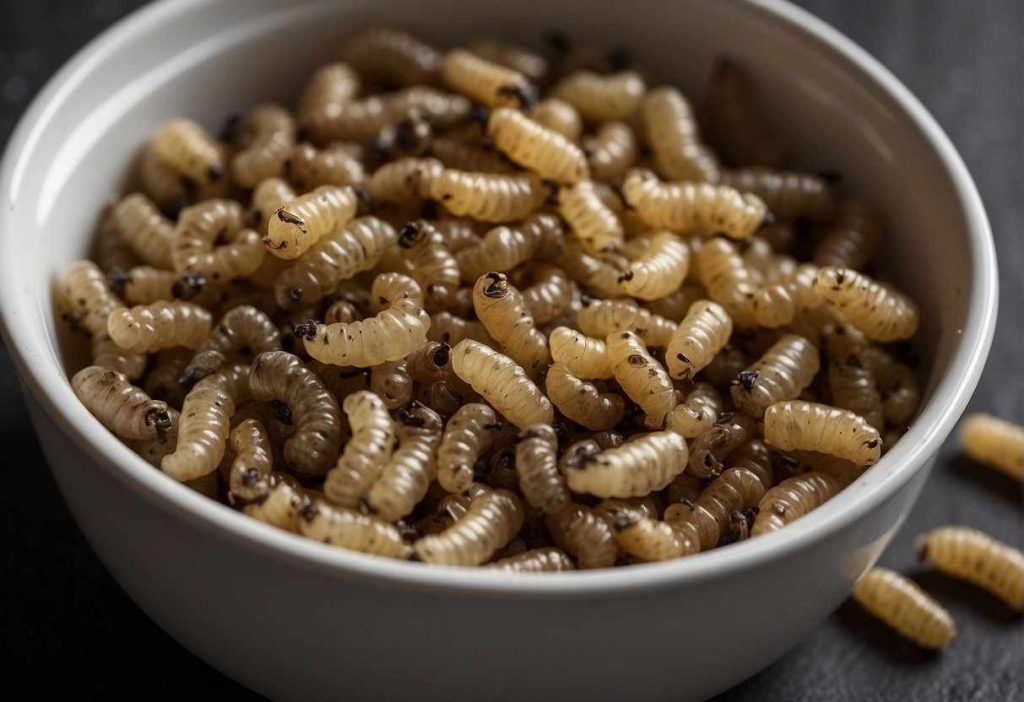
What to Keep an Eye Out For:
- Abnormal waste
- Visible larvae
Steps to Stay Ahead of the Game:
- Regular Check-ups: Keep on track with vet visits.
- It’s like a tune-up but for your furry buddy!
- Cleanliness: Keep that litter box spick and span.
- A clean home is a happy home!
- Education: Knowing is half the battle.
- Be aware of maggot risks and solutions.
Why Bother?
- Well-being: Your cat’s health is paramount.
- Prevention: Stop maggots in their tracks before they become a real headache.
Dealing with issues as uncomfortable as maggots in your cat’s poop is by no means a highlight of pet parenting. But hey, your proactive measures can make all the difference!
You’re the frontline defense against these pests.
Your watchful eyes and education on the matter are the best ways to nip the problem in the bud, ensuring your whiskered companion stays healthy and happy.
Stay sharp, stay informed, and keep those bad bugs at bay!
Frequently Asked Questions
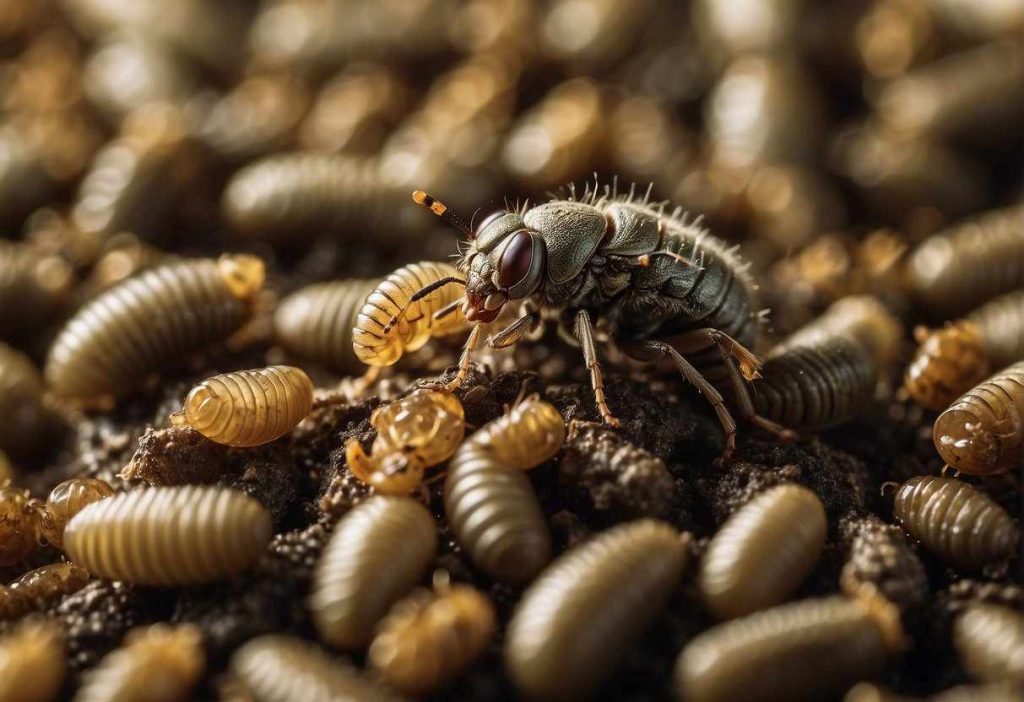
Dealing with maggots can be both concerning and confusing, and when it comes to your feline friends, you’re likely brimming with questions.
Let’s tackle some of the most common inquiries to help keep your cat safe and your mind at ease.
Can indoor cats also get maggots in their poop?
Absolutely! Even if your cat lives indoors, flies can sneak in and lay eggs in their litter box. Be vigilant and maintain a clean environment to minimize this risk.
What are the treatment options for a cat with maggots in their feces?
First off, consult your vet. They may recommend a professional cleaning of the affected area and possibly prescribe medication to kill any remaining larvae.
They may also suggest preventive treatments for the future.
What should I do if I find maggots in my cat’s litter box?
Don’t panic. Remove the maggot-infested waste immediately, clean the litter box thoroughly with a disinfectant, and replace it with fresh litter.
Check the area for any signs of larvae and keep an eye on your cat’s health.
Can maggots in cat poop affect human health?
They sure can. Maggots can potentially carry bacteria that cause diseases.
It’s wise to handle contaminated materials with gloves and wash your hands thoroughly afterward.
Is it possible for maggots to harm or even kill my cat?
While a maggot infestation might look grim, it’s rarely fatal.
Still, it can cause discomfort and health issues, so address the situation promptly and seek veterinary advice.
What are the signs that my cat might be suffering because of maggots?
Keep an eye out for excessive scratching, signs of distress, or irritation around your cat’s behind.
If there’s an infestation, you might also spot tiny, wriggling larvae in their feces or around their rear.
How often should I check my cat’s litter box for signs of maggots?
Regular checks are key. Daily scooping helps you spot early signs of maggots and keeps your cat’s environment clean and hygienic.
Make it part of your daily routine for the best prevention.
- How to Perform at an Online Casino - July 7, 2025
- Free Slots With Bonus and Free Spins - July 6, 2025

